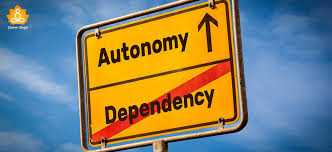There are a number of different dictionary meanings for this word, gentle reader.
They include "freedom from external control or influence", or "the power or right to act, speak or think as one chooses", or "the state of not being subject to or affected by something".
To me, the vital element of true autonomy lies in an individual or society's capacity to control, manage, develop and/or improve quality of life.
This element is particularly vital to people living with disability. In that case, personal autonomy is often dependant on the capacity to live without relying on others. Of course, for many the disability (which could be related to age or physical impairment) makes it impossible to get by without some form of external help, and the way in which this help is applied can make all the difference.
In other words, true autonomy means that the person being helped is in control and has the power to choose what kind of help is most useful and important. He/she should always be in charge.
And this is often when, with the best of intentions, it breaks down. By that I mean that well-intentioned people, often paid to help, will almost subconsciously begin to exert power and control over the individual or group. Once this happens, the relationship between the those being helped and those helping becomes a co-dependency.
This is unhelpful, and creates a situation which prevents any growth or development on the part of the dependent group or individual. This is what Noel Pearson often talks about. At the root of it all is resistance to the transfer of power from the helping agency to the target group, or individual.
And this, gentle reader is the main reason behind the lack of progress in improving quality of life for people in remote communities, indigenous or otherwise, and is what the Voice is all about.
Opponents of this transfer of power are often not aware of this issue, and are fearful of a change in the status quo.
Now I have often been admonished by Murris when I point out a similarity between the plight of people with disabilities, and people in remote communities, but I'd always insist there is a valid case to be made that the problem is about a transfer of power.
Until these people gain control of their own destiny, nothing will change.
Will the Voice achieve that?
I don't know, but it's a good place to start...





1 comment:
before; since; but never again... Once a uni debater, always a uni debater,,, especially the lefties.
Post a Comment